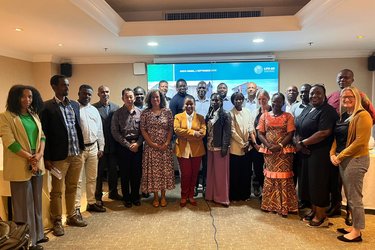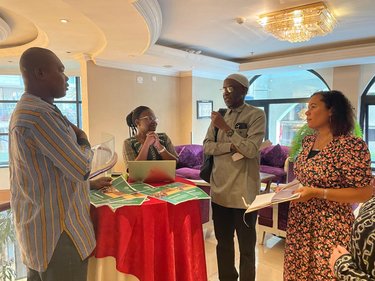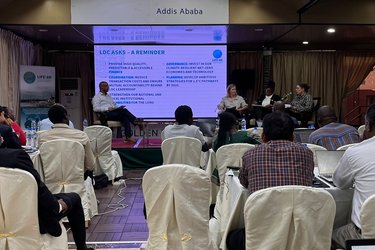
On 2nd and 3rd September 2025, LIFE-AR convened two dynamic learning events in Addis Ababa, Ethiopia. These sessions provided a vital annual platform for peer-to-peer exchange and strategic dialogue between Front Runner and Second Cohort Countries, LIFE-AR Board members and Development Partners.
The first day focused on peer learning between National Focal Points, with opening remarks from LIFE-AR's Technical Advisor, Gebru Jember Endalew, who welcomed new countries to the LIFE-AR initiative and reiterated the importance of the five LIFE-AR's principles:
Focal Points shared experiences, challenges, and innovations in implementing LIFE-AR. Highlights included:
Uganda’s Devolved Climate Finance (DCF) model, which channels 70% of climate finance directly to communities through Parish Climate Change Committees.
Burkina Faso’s participatory planning approach, involving separate consultations with women, men, youth, older people and persons with disabilities to ensure inclusive investment decisions.
Ethiopia’s targeted pilot in Kembebit Woreda, integrating dairy and poultry farming, solar energy, and biogas into a holistic climate resilience package.
Malawi’s district-led investments, including irrigation schemes, boreholes, and sustainable land management, despite challenges from flooding and inflation.
A key theme was the importance of community engagement throughout the investment selection, planning and implementation process. Countries emphasised the need for transparency, timely communication, and managing expectations to build trust, community ownership and ensure sustainability.
GESI was a central focus across both days. Chantelle Cummings, LIFE-AR’s GESI Advisor, led sessions exploring how gender equality and social inclusion are being integrated into climate adaptation efforts.
Countries shared practical approaches:
The Gambia is establishing a dedicated GESI Working Group with representation from government, civil society, academia, and the private sector.
Uganda has embedded GESI into all governance structures, ensuring representation in PCCCs (Parish Climate Change Committees) and providing support for participation, such as childcare and transport.
Burkina Faso created focus groups to ensure women and youth could speak freely, overcoming cultural barriers to participation.
Ethiopia incorporated GESI into national and local taskforces, with 40% representation of women and youth in committees and investment beneficiaries.
Challenges such as cultural norms, budgeting constraints, and limited professional capacity were openly discussed. Focal Points agreed that intentionality, planning, and structural support are essential to ensure equity – not just equality – in climate action.

The country investments marketplace was a highlight of the second day. In this interactive session, National Focal Points set up stalls where participants engaged in small group discussions. This format allowed for direct exchange on country experiences, innovations, and lessons learned, and was widely praised for its energy, openness, and effectiveness. The format created space for rich dialogue and was widely praised for its energy and effectiveness.
Burkina Faso shared how communities identified priorities through inclusive focus groups and general assemblies, leading to investments in land restoration, water access, and forest protection. Ethiopia presented its integrated package of dairy and poultry farming, solar energy, and biogas, all selected through bottom-up planning and implemented during the Establishment Phase. Malawi highlighted its district-led investments in irrigation, boreholes, and land management, while Uganda showcased its devolved climate finance model and inclusive procurement processes.
A key theme throughout the day was the “business unusual” mindset. Through LIFE-AR, countries are moving away from top-down approaches and instead prioritising community-led planning, flexible delivery mechanisms, and integrated governance. Ethiopia’s use of 85% of its Establishment Phase budget for direct community investments and Uganda’s structured, inclusive planning process are strong examples of this shift.
Discussions also focused on scaling successful pilots. Burkina Faso is clustering interventions across communes and exploring pooled funding mechanisms to expand impact. Malawi is embedding locally led adaptation into District Development Plans and refining its delivery system based on early lessons.
Following the marketplace, the strategic plenary session brought together LIFE-AR Board members, Development Partners, and country teams for deeper dialogue on delivery systems, finance, and learning.
Monitoring, Evaluation and Learning (MEL) was a central topic. Development Partners such as FCDO and QCF shared how they are moving away from rigid, output-based metrics and embracing impact-driven narratives. Uganda and Malawi are integrating participatory monitoring and GESI-sensitive indicators into their MEL systems, with district-level champions collecting and reporting data.
The need for long-term, predictable finance was a recurring theme. Benin and Senegal called for support in preparing funding proposals and accessing climate finance. Development Partners responded positively, expressing openness to multi-year partnerships and adaptive programming aligned with LIFE-AR’s principles.
The session also reinforced the importance of aligning LIFE-AR with global frameworks such as the Paris Agreement, the Sustainable Development Goals (SDGs), and the Sendai Framework. Development Partners acknowledged LIFE-AR’s potential to serve as a model for country platforms that bring together funding, policy, and delivery in a coherent and locally led way.
Together, the marketplace and plenary sessions demonstrated the strength of LIFE-AR’s collaborative approach and the value of peer learning in advancing locally led climate action.

Bethany Donithorn, Head of Learning in the LIFE-AR Interim Secretariat, facilitated sessions on establishing national and peer-to-peer Communities of Practice (CoPs). These CoPs aim to:
Participants committed to mapping potential members, defining shared interests, and establishing communication platforms to sustain collaboration beyond the event.
The learning days in Addis Ababa reaffirmed LIFE-AR’s vision: that no one is left behind in the journey towards climate resilience. Through peer learning, inclusive governance, and strategic partnerships, LDCs are demonstrating leadership in locally led adaptation.
As LIFE-AR transitions into its next phase, the lessons from Addis will guide efforts to strengthen delivery systems, mobilise sustainable finance, and embed GESI across all levels of climate action.
The spirit of collaboration and innovation that defined these two days will continue to shape LIFE-AR’s journey, ensuring that communities remain at the heart of climate adaptation decisions.